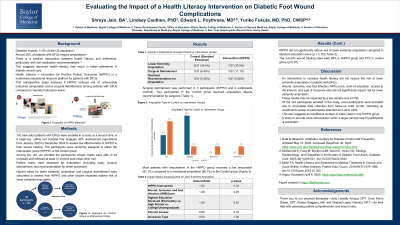Health Economics
(HE-007) Evaluating the Impact of a Health Literacy Intervention on Diabetic Foot Wound Complications
Friday, May 2, 2025
7:45 PM - 8:45 PM East Coast USA Time

Lindsey Cauthen, PhD – Principal, Office of Education Affairs, Baylor College of Medicine; Edward Poythress, MD – Professor of Medicine, General Internal Medicine, Baylor College of Medicine; Yuriko Fukuta, MD, PhD, CWSP – Assistant Professor of Medicine, Infectious Diseases, Baylor College of Medicine
Introduction: Diabetes impacts 11.6% of the US population (1). Management of diabetic foot ulcers (DFUs) is challenging, and approximately 20% of patients with DFUs require amputations (2). To address the barriers health literacy poses to diabetes management, we evaluated a multimedia educational resource platform called Health Literacy + Innovation for Positive Patient Outcomes (HIPPO) for patients with DFUs. Our retrospective study explored if HIPPO reduced risk of unfavorable outcomes among patients with DFUs compared to standard education alone.
Methods: An open-label trial was performed at a wound clinic in a large-city, safety net hospital that serves underserved populations including immigrants. Newly referred adult participants with DFUs were randomly assigned to an intervention group (HIPPO) or control group. The intervention group viewed seven, 3–5-minute multilingual instructional videos and graphic illustrations during 3 separate clinical visits and had access to this material at home. The control group received only standard of care. The participants whose chart reviews were available for at least 12 months post-initial clinic visit were assessed for amputation, surgical debridement, and recommendation for either procedure. Hazard ratios were calculated.
Results: Seventy-one participants each were assigned to the HIPPO group and control group. Fifty-eight participants met criteria with 31 and 27 in the control and intervention groups, respectively. The 3-month wound healing rates were 68% in HIPPO group and 67% in control group (p=0.97). The HIPPO intervention did not significantly reduce risk of lower extremity amputation, compared to standard education alone (7/27 (25.9%) vs. 6/31 (19.4%), respectively; p=0.18). Surgical debridement was performed in 3 participants (HIPPO) and 2 participants (control). Two participants in the control group declined amputation despite recommendation by surgeons. Wound, Ischemia, and Foot Infection score (p=0.25), highest education level received (p=0.83), internet access (p=0.24), and insurance type (p=1.00) also did not significantly impact risk for amputation.
Discussion: An intervention to increase health literacy did not reduce the risk of lower extremity amputation in patients with DFUs. This result can be explained by a low sample size or an insufficient number of video views in the HIPPO group. A study to provide more interventions within a larger sample of participants is warranted.
Methods: An open-label trial was performed at a wound clinic in a large-city, safety net hospital that serves underserved populations including immigrants. Newly referred adult participants with DFUs were randomly assigned to an intervention group (HIPPO) or control group. The intervention group viewed seven, 3–5-minute multilingual instructional videos and graphic illustrations during 3 separate clinical visits and had access to this material at home. The control group received only standard of care. The participants whose chart reviews were available for at least 12 months post-initial clinic visit were assessed for amputation, surgical debridement, and recommendation for either procedure. Hazard ratios were calculated.
Results: Seventy-one participants each were assigned to the HIPPO group and control group. Fifty-eight participants met criteria with 31 and 27 in the control and intervention groups, respectively. The 3-month wound healing rates were 68% in HIPPO group and 67% in control group (p=0.97). The HIPPO intervention did not significantly reduce risk of lower extremity amputation, compared to standard education alone (7/27 (25.9%) vs. 6/31 (19.4%), respectively; p=0.18). Surgical debridement was performed in 3 participants (HIPPO) and 2 participants (control). Two participants in the control group declined amputation despite recommendation by surgeons. Wound, Ischemia, and Foot Infection score (p=0.25), highest education level received (p=0.83), internet access (p=0.24), and insurance type (p=1.00) also did not significantly impact risk for amputation.
Discussion: An intervention to increase health literacy did not reduce the risk of lower extremity amputation in patients with DFUs. This result can be explained by a low sample size or an insufficient number of video views in the HIPPO group. A study to provide more interventions within a larger sample of participants is warranted.

.jpg)